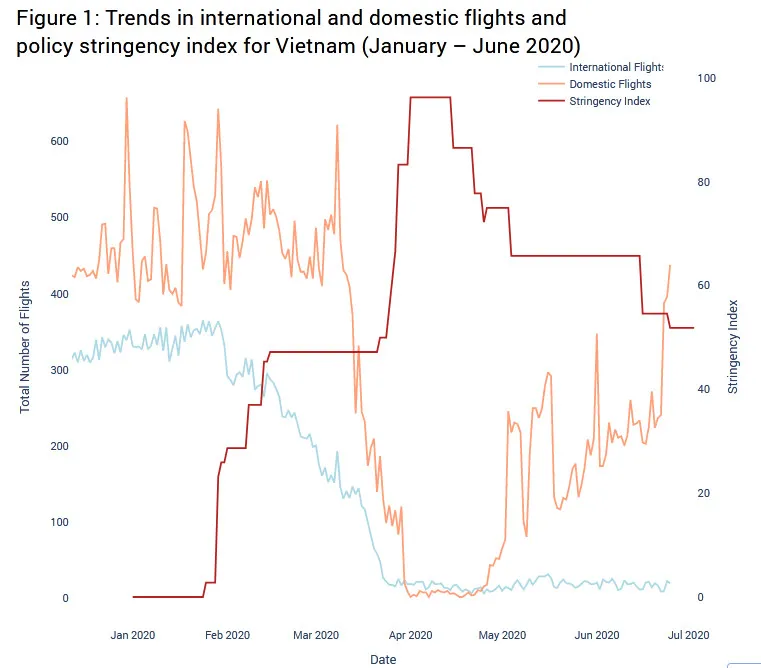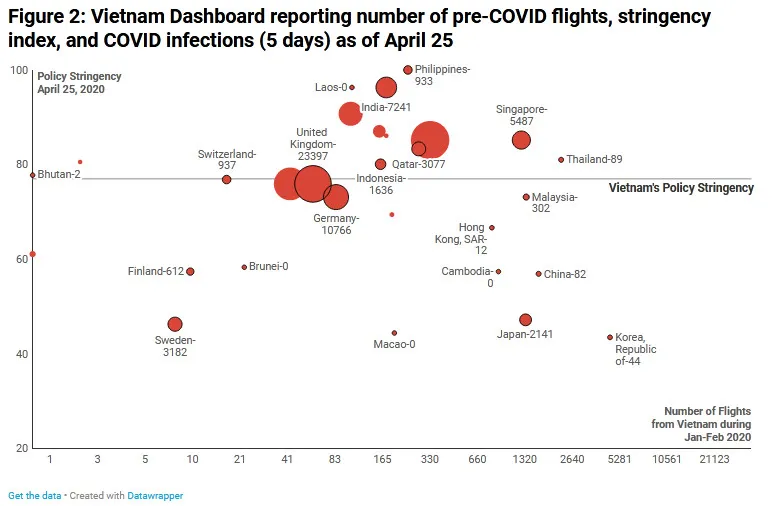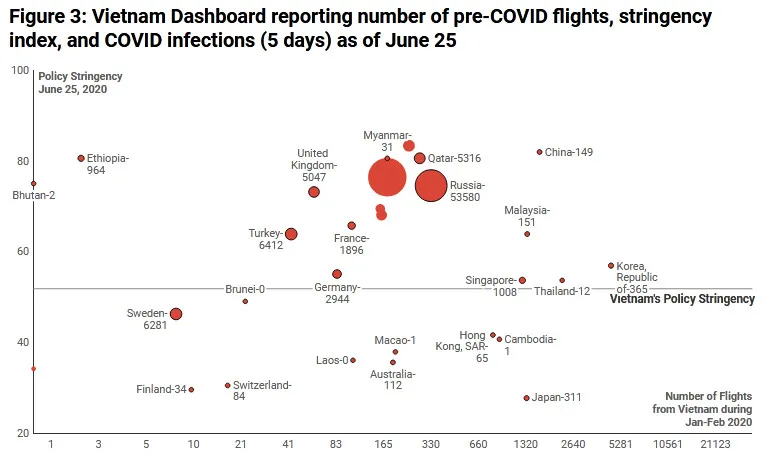Reopening international flights during Covid-19: a new real-time big data dashboard applied to Vietnam
Opening economies during Covid-19 is obviously a quantitative but also qualitative challenge. While data should be an important element of decision making, the choice should ultimately reflect how a society can best save lives and bring economic gains.
How long can an economy survive without allowing international flights in and out? Since the Covid-19 outbreak, the world has all but shut its doors. If, before the pandemic, more than 100,000 flights were taking off on any given day worldwide, the number of scheduled flights has been down by over 60 percent over the past few months. This has helped contain the coronavirus, but it has also led to enormous economic losses, especially for the aviation industry and the tourism sector. The social pressure has also mounted for separated families and friends that are eager to see each other again.
Several countries, particularly in East Asia and Europe, are in the process of reopening their economies after imposing nationwide lockdowns. The policy challenge is how to reopen, especially across borders, while keeping people safe. The health situation can still change in a matter of days, as demonstrated recently by the reemergence of Covid-19 infections, for example, in China and Germany.
The decision to reopen an international flight could be influenced by three main factors. First, it should involve countries that are mutually considering easing mobility restrictions – it doesn’t make sense to open a flight with a country that is still in strict lockdown. Second, greater consideration should be on safe areas or locations – to minimize the risk of coronavirus propagation. Third, there should be more incentive to open routes that will bring more visitors and economic gains. The challenge for policy makers is not only to combine these three factors in their decisions but also to monitor them over time. The uncertainty around the pandemic means that a decision could appear justified at one point in time but wrong or dangerous a few weeks later.
We propose a new dashboard that combines three sources of big data in almost real time. First, the stringency index measured by the Oxford Covid-19 Government Response Tracker (OxCGRT), which provides a comparison of how social distancing and mobility restrictions have evolved per country over time. Second, the number of reported Covid-19 infections over the past five days that captures the health situation in each country (source: Johns Hopkins University). Third, the number of flights between destinations (as tracked from the aviationstack API), which should give us an idea of their economic importance.
While our dashboard can be used for any country, we will apply it to Vietnam – a country well advanced in its fight against Covid-19. In recent weeks, the government has lifted almost all domestic preventive measures and reopened most domestic flights (Figure 1). As recently mentioned by the prime minister, the authorities are also considering reopening a number of international routes even if the current number has remained extremely limited.
Our dashboard for Vietnam is available on daily and weekly basis. These links both are dynamic and inter-active, in the sense that they are being automatically updated and users can slide across their periods of interest. They show the evolution of our three factors since end December 2019.
Let us illustrate how our dashboard can help Vietnamese policy makers in two ways. First, it establishes a ranking of countries with respect of the three criteria defined above at a specific point in time. For example, Figure 2 (which is a snapshot of our dashboard) shows the results we obtained on April 25, where the x-axis denotes the number of international flights originating from Vietnam in January and February 2020 prior to the lockdown, while the y-axis is the latest policy stringency. The size of the bubble denotes the number of newly reported cases in the past five days.
At this time, the prime candidates for reopening of international flights would have been the Republic of Korea and China, as these two destinations are important economically for Vietnam (as captured by the number of flights). These two countries were also reporting a relatively low number of Covid-19 cases (in the last five days prior to April 25) and had lifted many of their mobility restrictions. Opening to Hong Kong SAR and Cambodia could also have been considered, as these two destinations appeared relatively Covid-19 safe and mobile. Reopening with Thailand would have been justified in terms of number of flights and health safety, but not in terms of the stringency index as the country was still in partial lockdown.
Our dashboard also allows policy makers to monitor the situation over time. If we compare our results above with those obtained on June 25 (Figure 3), Korea remains a prime candidate for reopening, but not China. This is because China’s number of reported Covid-19 cases has increased as well as its mobility restrictions – reflecting the recent outbreak in Beijing and the associated measures adopted by the authorities. By contrast, Thailand has risen in our ranking, as it continues to be relatively Covid-19 safe (only 12 reported cases in the five prior days) and has reduced its mobility restrictions. It is worth noting that Japan has also become an option, not only because of its economic importance for Vietnam but also because of its decrease in Covid-19 cases and mobility restrictions in recent weeks.
Our big data dashboard offers information that is useful for policy makers as they consider reopening their economies gradually to the rest of the world. It allows them to weigh the respective importance of safety, financial gains, and mobility not only in their own country but also in the countries they might reconnect with. However, our methodology should be viewed as indicative, because the quality of the data on Covid-19 is strongly influenced by countries’ individual testing capacity. It is also only a first step, as the reopening of international flights should be accompanied by supporting measures, including pre-screening at departure and various surveillance and response measures to quickly address any potential vulnerabilities. Good digital data governance and sharing arrangements will clearly be critical to ensure that timely data is in place for decision making.
Opening economies during Covid-19 is obviously a quantitative but also qualitative challenge. While data should be an important element of decision making, the choice should ultimately reflect how a society can best save lives and bring economic gains. We hope that our proposed methodology demonstrates how big data analysis can contribute in responding to this critical challenge.
This work was supported through the Australia-World Bank Group Strategic Partnership - Phase 2 (ABP2).
The article was reprint from World Bank Blogs.
Authors:
Kai Kaiser is Senior Economist, World Bank
Parvathy Krishnan is Data Science Consultant
Jacques Morisset is Lead Economist and Program Leader, World Bank














